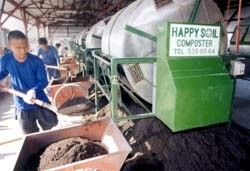
Challenge
Population growth, urbanization and industrialization have created enormous pressures on the environment and life support systems upon which all Filipinos depend. Air pollution from vehicles and industry is a major public health concern. Nearly 2.5 million tons of hazardous waste is generated each year, and only forty percent of solid waste is collected while the rest is dumped into waterways and open spaces. Although major legislation on clean air, solid waste, and clean water has been passed, enforcement remains a challenge. Under these conditions, voluntary private initiatives are often the most effective way to reduce pollution and conserve energy.
Initiative
"Greening the supply chain" is a process by which buyer companies impose environmental performance requirements on their manufacturing partners and vendors. USAID has encouraged this process, supporting five two-day workshops for more than 100 participants from 49 businesses. To sustain the initiative, all participating businesses were invited to attend a full-day environmental forum each quarter. More training and mentoring was provided by the Philippine Business for Social Progress, bringing the total number of companies participating in the program to 300.
Results
Dozens of companies have improved their environmental practices and performance, including Central Azucarera de Don Pedro (CADP) in Nasugbu, Batangas. The largest producer of raw sugar in the country, CADP responded to USAID's initiative by sponsoring a composting facility that is generating jobs, skills and income for the community. The facility processes most of CADP's organic waste and will soon expand to accept municipal waste. CADP's adoption of energy conservation and efficiency measures have given it preferred procurement status from partner, Nestlé. This move has resulted in an annual company savings of more than 33 million pesos ($600,000), providing dramatic proof of how improved environmental operating procedures can benefit corporate bottom lines.







Comment
Make a general inquiry or suggest an improvement.